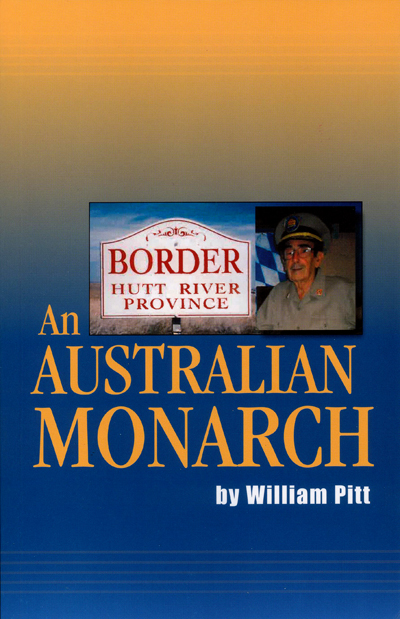
| current issue |
| archives |
| submissions |
| about us |
| contact us |
| short story competition |
sponsored by

Review of An Australian Monarch by William Pitt Carla Billinghurst |
|
Or indeed any other self-declared nation? Generally you would expect issues of race and language and geography to be involved. Peter Ravn Rasmussen at What Is Micronationalism believes that the basis for nationhood is a durable and coherent culture is:
In the case of the Hutt River Principality there seems to be only one issue: bureaucracy. Prince Leonard led his tiny nation (a 75km2 West Australian farm) into independence in 1970 when the WA government imposed a ludicrously small wheat quota on farmers. This was the time of Milk Marketing Boards and Fishing Quotas when the governments of many nations, especially Britain and Australia, seemed to think that all they had to do to rescue their failing economies was impose limits on producers and watch the market price inflate. Prince Leonard's raspberry to this way of thinking is an example to us all. Faced with a government that threatened his livelihood, he found legal loopholes (sadly since closed) allowing him to declare his farm an independent principality. He appears to have paid no taxes to Australia since secession and has kept himself and his people juuust on the right side of the law. The issues involved are fascinating and fun. Legally, the prince depends on the British Law of Tort governing the behaviour of masters towards servants, the Geneva Convention and the American Montevideo Convention. He uses Commonwealth and International Law as and when it suits him and apparently has WA bureaucrats running scared, reduced to threatening him with “we are watching you”. If the writing was as entertaining as the subject matter, this would be a great book. As it is, I think it's a middling book sorely in need of an editor. Primarily this is because the tone of the book is uncritically pro-Hutt River; there is no attempt at investigation or analysis – no teasing out of the thorny moral issues involved. One that I would have liked Pitt to pursue is precisely the fact that Prince Leonard does not pay taxes. Hmm – does he use the local hospital? Roads? School system? If so, do we as law-abiding tax-payers think he should pay taxes or are we happy to subsidise his mini-rebellion? What is it costing us and what are we gaining from it? In Game Theory people in Prince Leonard's position are called “Loners” - they don't play the game but they profit because everyone else does. An example is of those who benefit from Union-gained wage rises or workplace improvements but who refuse to join up and pay Union dues to support the work of negotiating these benefits. Another example would be those who refuse to pay extra for sustainably produced fish but who benefit from having healthier oceans and from the long-term survival of the fishing industry. On the other hand, Loners can be useful in checking unthinking participation: unions and fish-sellers alike are prevented from over-pricing because every game player has a threshold which will make him/her into a Loner. Pitt's praise of the Hutt River micromonarchy also leads him into the trap of telling us what Prince Leonard thinks or says instead of letting the monarch speak for himself. It is often unclear whether an opinion originates with Pitt or with the Prince and the line of an argument often simply dissipates before it reaches any sort of conclusion beyond “Obviously....” He can be sloppy – he offers a top secret government memo leaked in 1989 but doesn't tell us when the document was written. Furthermore, the Canberra employee who leaked the document was apparently arrested,charged and taken to court but for some reason the story isn't followed up. Who was this heroic bureaucrat and what happened to him/her? And why did all the Hutt River mail go via Canada for a while? Why Canada?! At one point, describing the silence from both the Federal and the WA governments on the declaration of the Principality, Pitt says “We shall never know the reason for this.” Well, did you ask?! I'd love to know what either government thinks about all this – is Hutt River a tourism goldmine or a millstone or just an account that the Tax Office will catch up with at some point in time? It would probably only take one phone call to find out. And without the other side of the story, the government side, it isn't really clear that this is a David and Goliath story; it sounds much more like:
Which is a shame because there are hints in here that public servants were (and still are) quite agitated about the whole episode. And from the Grammar Nazi point of view – aargh! These are a few of the wounded phrases a good editor could have had taken out and shot:
And this one – I have to quote the whole paragraph to really convey its full impact:
I enjoyed the chapters giving a potted history of Australia and I came away with a better sense than I had before of how casually the Australian continent was partitioned into states and territories. Pitt works hard to present a history of Australian rebelliousness leading naturally to declarations of secession but he mostly seems to be describing moments of Irish convict indignation. Speaking as someone who migrated here in my late-twenties, I don't find Australians naturally rebellious. They strike me as very comfortable in their warm, well-fed lives with their habitual combination of officiousness and obedience. Revolution comes more naturally to some peoples than to others. The French for example regard officialdom as pointless and irritating. If a road is blocked, they will drive on the pavement. They call this “Systeme D” - Wikipedia tells us:
Answers.com goes further:
Maybe Prince Leonard is French? The British, when pushed, have a similar attitude – when Margaret Thatcher introduced the Poll Tax along with threats of imprisonment for non-payment, the British paid this most unpopular of taxes. They paid it with garden produce, granny's wardrobe, scrap metal...my favourite poll tax story was of the man who turned up with six live rabbits and an affidavit from his butcher giving the current market price of rabbit meat. He offered to slaughter the rabbits on the spot. Other micronations around the world are set up deliberately to draw attention to injustice or the way governments whittle away at our freedoms. Fela Kuti's Kalakuta Republic, a focal point for Nigeria's “have-nots”, comes to mind or Sealand, off the East coast of England, offering cheap, internet hosting with no government monitoring. So I like the idea of Prince Leonard and his small but meaningful rebellion. I think some editing would have made the book much more readable and a wider perspective explaining why this place is meaningful and what such a stance means to Australians, explaining Australia to the world, would have made it more interesting. After two readings I still can't answer the question: “What's the point of the Principality of Hutt River?” but this book is a place to start and cheaper than flying to WA. About the Author Carla is the reviews editor for Perilous Adventures.
|
 What's the Point of France?
What's the Point of France?